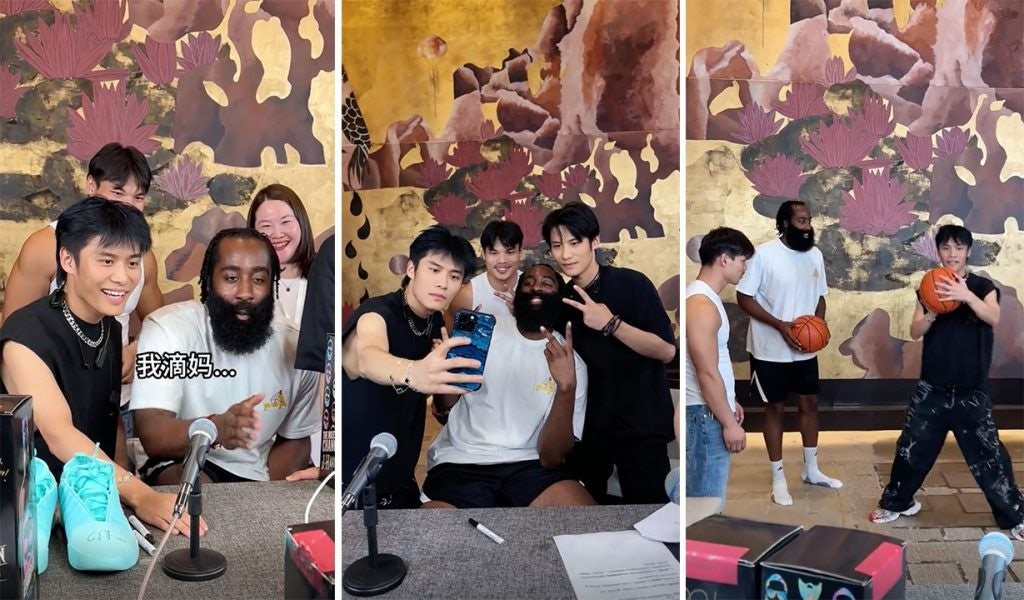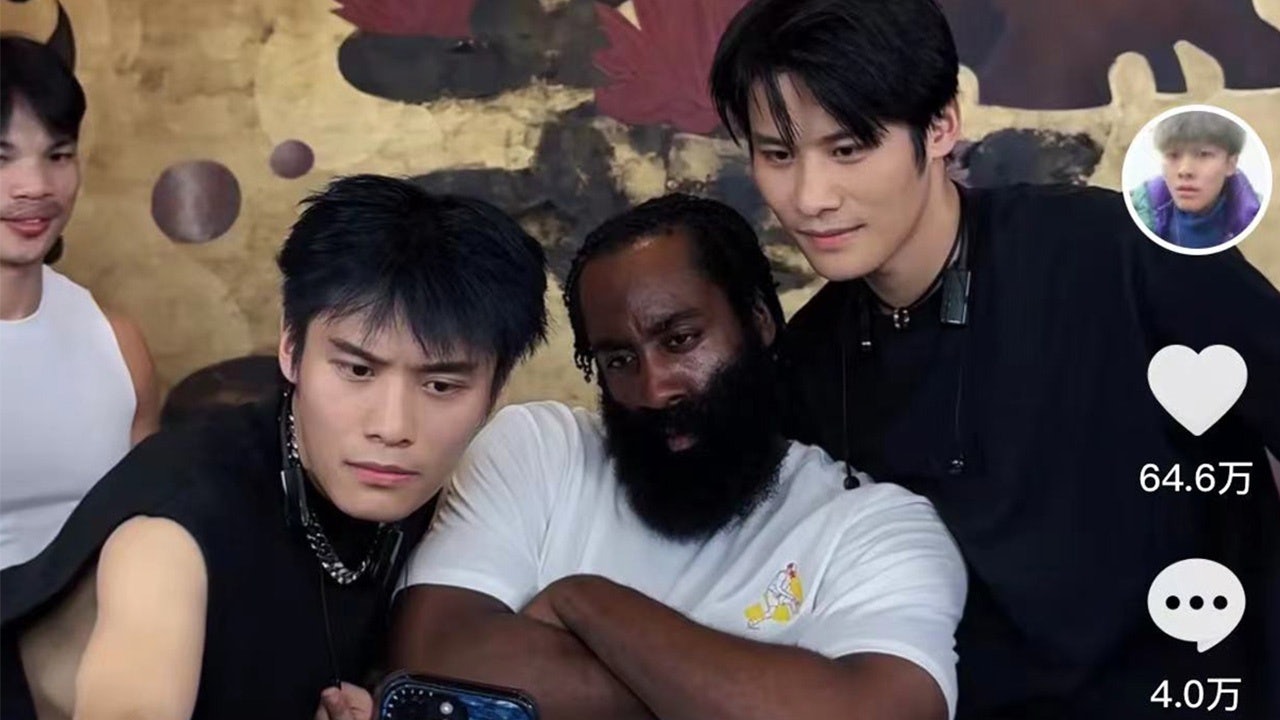Ten thousand bottles in five seconds. It’s an impressive number that would leave any seller in disbelief and doing a celebratory cartwheel on camera.
That is, if they’re not accustomed to Chinese livestreaming.
On August 15, NBA star James Harden went live on Douyin with Chinese social media influencer Crazy Little Brother Yang to promote his personal wine brand, J-Harden Wines. Harden told viewers that he normally sells a few cases in a day — he was stunned when all 10,000 bottles sold out in seconds.
“No way!” Harden shouted as he rushed over to the computer to double check the numbers.
On Weibo, where the Philadelphia 76ers guard has 2 million followers, his reaction to the livestream went viral. The hashtag “Harden is shocked at the speed of selling goods in China” (#哈登震惊于中国卖货速度) accumulated almost 270 million views, as netizens joked that the first championship of his career is “sales champion” (销冠) and invited him to join the Chinese Basketball Association.
Laughs aside, having a 10-time All Star team up with a top-tier KOL seems like an easy way to score points in China’s e-commerce court. But is it a play that other brands can follow?
China loves Harden, and Harden loves China#
The livestream comes as Harden, aka “The Beard,” returns to China for the first time in four years to meet fans and attend events. In addition to being named NBA MVP in 2018 and one of the league’s 75 greatest players of all-time in 2021, the 33-year-old boasts a signature shoe line with Adidas.
According to Jacob Cooke, co-founder and CEO of WPIC Marketing + Technologies, basketball stars differ from traditional celebrities in that the majority of their fans are men, with most falling into the 25-34 age group.
“These are digital natives in high-tier cities with high purchasing power. So, for brands whose target customers include men, basketball fans represent a lucrative demographic that can be reached through collaborations with NBA stars, the NBA, or other basketball-themed activations,” he says.
But it’s not just talent that draws Chinese fans to Harden. Last week, the athlete received strong support from local audiences after slamming the Sixers’ president Daryl Morey during his Adidas tour. Despite Harden requesting a trade over a month and a half ago, the team leaked that it was ending all trade talks last week, reversing its stance before the start of the season.
“Daryl Morey is a liar and I will never be a part of an organization that he's a part of,” Harden said at an event in Beijing on August 14.
And he certainly found the right crowd to vent his anger to. China isn’t a big fan of Morey after he tweeted in support of the Hong Kong rioters in 2019 and caused a year-long suspension of NBA games on China Central Television (CCTV). The Houston Rockets, the team Morey was with at the time, was even blacklisted by CCTV for an additional season.
When the controversy first broke, Harden, who was also on the Rockets with Morey, had responded with an apology to China.
“We apologize. You know, we love China. We love playing there," Harden said, putting himself in the country’s good graces. "For both of us individually, we go there once or twice a year. They show us the most support and love.”
Livestreamers’ commercial power#
Now take this star power and amplify it by teaming it with one of China’s biggest livestreamers. Crazy Little Brother Yang (@疯狂小杨哥), a 28-year-old comedy creator, was the first ever blogger to hit 100 million followers on Douyin in November 2022.
The biggest advantage of joining forces with Crazy Little Brother Yang is, of course, his massive following; Harden’s livestream was viewed by 15 million people, according to Global Times. With this audience, the Anhui-born KOL has built an e-commerce empire that generated 97 million (700 million RMB) in livestream sales in the past three months alone, reported Huitun Data.

“In Harden’s case, his visit to China offered a short window to maximize publicity and drive wine sales. Yang is the biggest Douyin celebrity, and many of his viewers are in the same demographic as Harden’s fans, so Yang’s channel made for a good partner to generate buzz around the trip,” Cooke says.
But working with the country’s top livestreamers is not only challenging, it also comes at a cost.
“Most brands are not owned or operated by superstar NBA players or global celebrities, and their products are rarely scarce,” says Jacques Roizen, Managing Director, China Consulting at Digital Luxury Group. “As a result, it’s a lot harder for them to partner successfully with superstar livestreamers without incurring the impact of deep discounting, the high cost of commissions, and the pressure it puts on their logistics.”
Success doesn’t come cheap#
As Roizen outlines in a LinkedIn post, the biggest Chinese livestreamers are extremely selective about the brands and products they agree to peddle, meaning brands often have to offer “unprecedented discounts or benefits” to be chosen.
“In addition to a deep discount, the economic equation for brands is further challenged by the very steep commissions superstar livestreamers will demand — usually a combination of fixed and variable fees that add up to at least 30 percent of GMV, before returns!” he writes.
That’s another issue. Returns on orders placed during livestreams can be as high as 50 percent on apparel and 30 percent on accessories, he adds.
“Unfortunately, livestream purchases are far more impulsive than regular ecommerce purchases in China … The decision to really purchase takes place not when placing the order, but when goods are received. From that standpoint, livestream GMV before returns is a very misleading indicator, in most cases,” Roizen tells Jing Daily.
Understanding the livestream opportunity#
Although teaming up with China’s top KOLs may not be feasible for every brand, the Harden appearance underlines the power and speed of livestream e-commerce in the country. According to research firm eMarketer, livestreaming generated sales of 480 billion in China last year and could grow by 30 percent this year. It’s proving to be a resilient industry against the backdrop of the country’s economic slowdown.
Brands interested in finding livestreaming success on local e-commerce platforms should first clarify their objectives. They can either focus on brand awareness by hiring an expensive host and creating a sophisticated production or prioritize conversion by using a brand expert and inviting loyal customers, says Roizen.
Either way, there’s the fine print behind the flashy headlines. Brands that want to reap the rewards of China’s booming livestreaming sector will need to have skin in the game.



